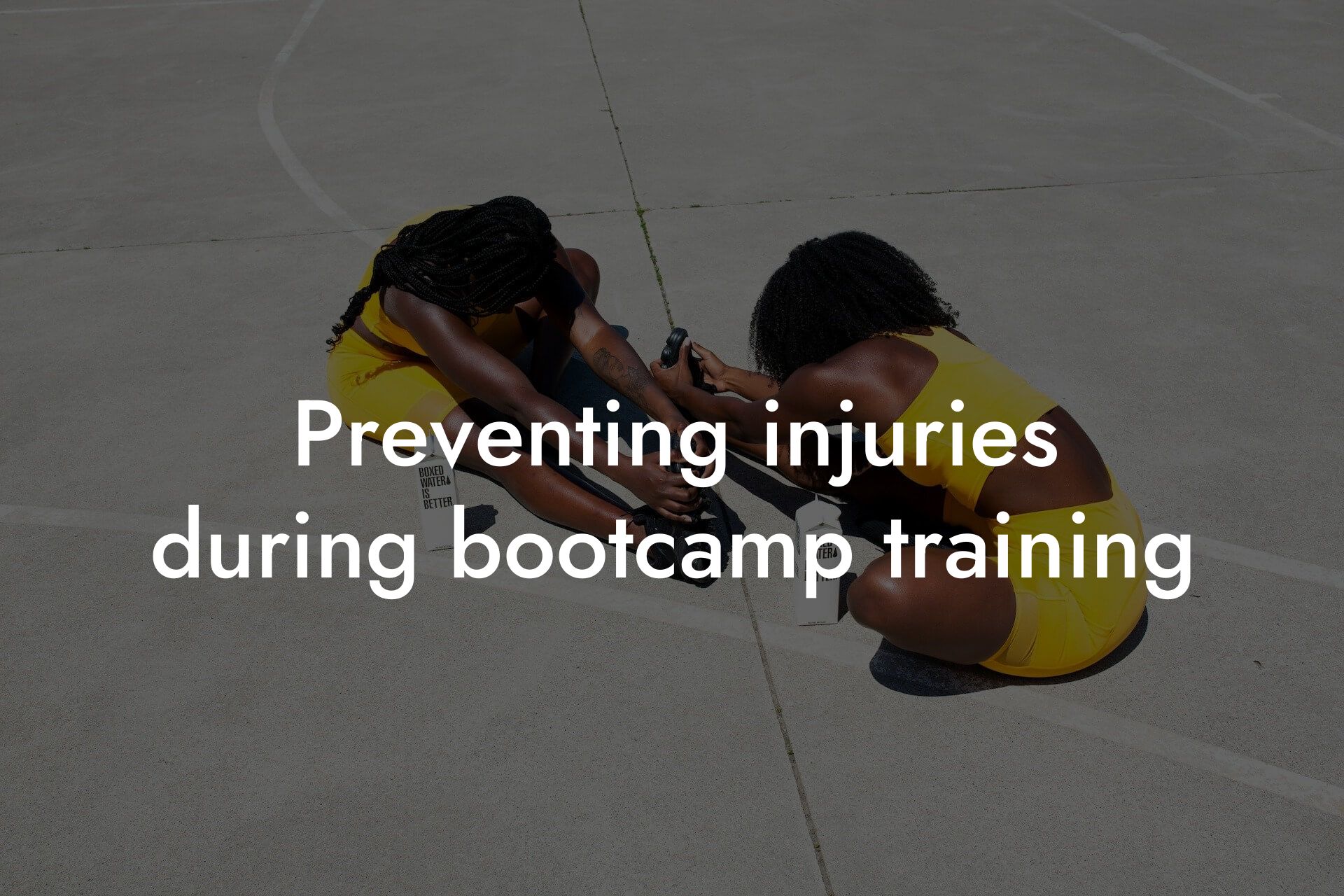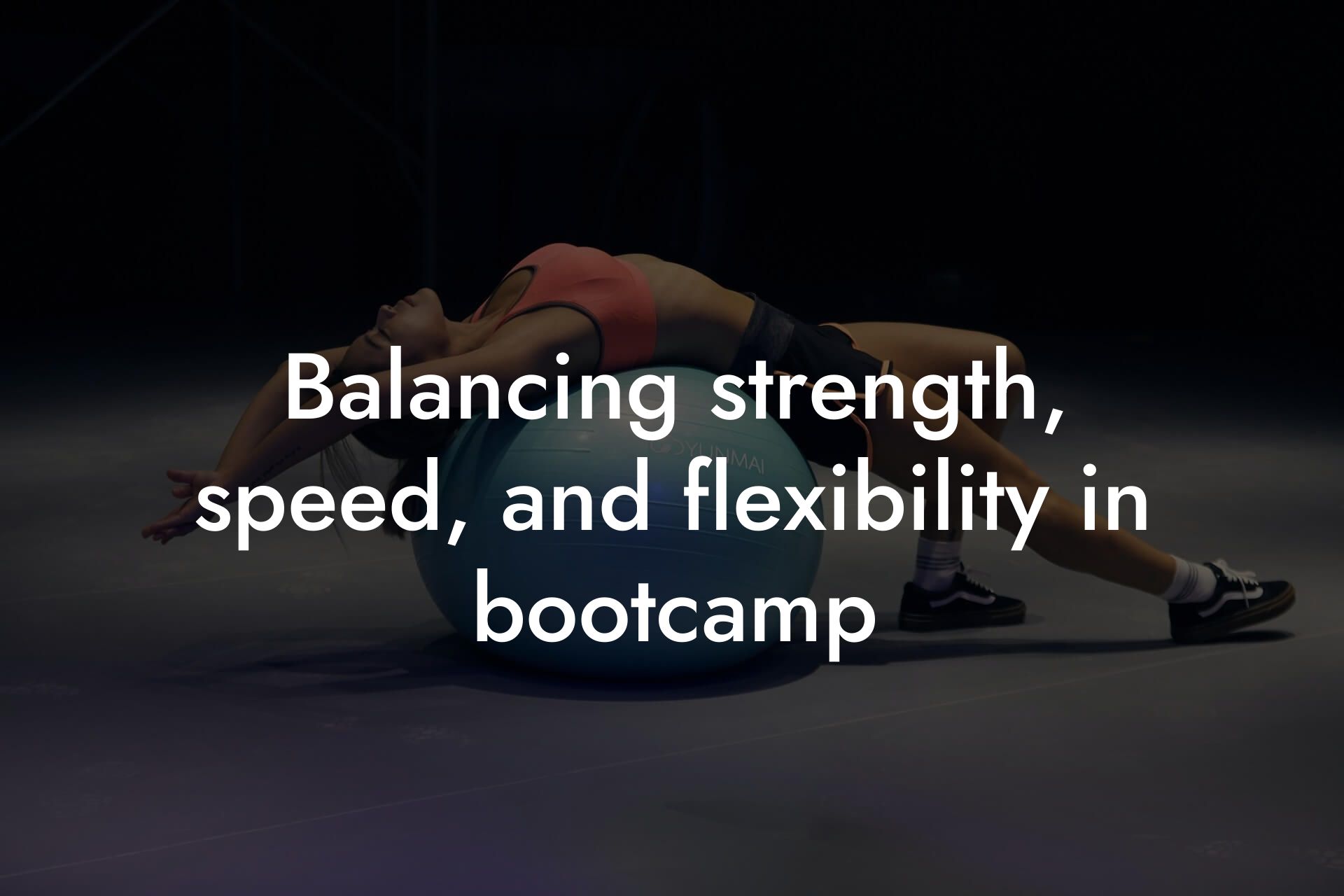Understanding the Importance of Endurance and Strength in Bootcamp Workouts
As a high-earning professional, you understand the importance of maintaining a healthy and fit physique. Bootcamp workouts are an excellent way to improve your overall fitness, but they can be challenging, especially if you're new to this type of exercise. Two essential components of bootcamp workouts are endurance and strength. Endurance refers to your body's ability to sustain physical activity over a prolonged period, while strength refers to your ability to generate force against resistance. Improving both endurance and strength is crucial to getting the most out of your bootcamp workouts and achieving your fitness goals.
Table of Contents
- Understanding the Importance of Endurance and Strength in Bootcamp Workouts
- Benefits of Improving Endurance in Bootcamp Workouts
- Benefits of Improving Strength in Bootcamp Workouts
- Exercises to Improve Endurance in Bootcamp Workouts
- Exercises to Improve Strength in Bootcamp Workouts
- Tips for Improving Endurance and Strength in Bootcamp Workouts
- The Role of Nutrition in Improving Endurance and Strength
- How DEXA Scans Can Help Improve Endurance and Strength
- Frequently Asked Questions
Benefits of Improving Endurance in Bootcamp Workouts
Improving your endurance in bootcamp workouts can have a significant impact on your overall fitness. Some of the benefits of increased endurance include:
• Increased stamina: With improved endurance, you'll be able to perform daily tasks and exercises with more energy and efficiency.
• Enhanced cardiovascular health: Regular endurance training can help lower your risk of heart disease, stroke, and high blood pressure.
• Weight loss: As you increase your endurance, you'll be able to burn more calories and shed unwanted pounds.
• Improved mental toughness: Pushing through challenging endurance exercises can help build mental resilience and discipline.
Benefits of Improving Strength in Bootcamp Workouts
In addition to endurance, improving your strength in bootcamp workouts is equally important. Some of the benefits of increased strength include:
• Increased muscle mass: As you build strength, you'll also build lean muscle mass, which can help boost your metabolism and burn more calories at rest.
• Improved bone density: Resistance training, a key component of strength building, can help improve bone density, reducing the risk of osteoporosis and fractures.
• Enhanced athletic performance: Increased strength can improve your overall athletic performance, allowing you to perform daily tasks and exercises with more power and efficiency.
• Better body composition: As you build strength, you'll be able to maintain a healthier body composition, with more lean muscle mass and less body fat.
Exercises to Improve Endurance in Bootcamp Workouts
To improve your endurance in bootcamp workouts, focus on exercises that challenge your cardiovascular system and increase your stamina. Some examples include:
• Burpees: A full-body exercise that combines strength and endurance, burpees are an excellent way to improve your overall fitness.
• Jumping jacks: A classic cardio exercise, jumping jacks are an excellent way to get your heart rate up and improve your endurance.
• Sprints: Whether you're sprinting on a treadmill or outdoors, this high-intensity exercise is an excellent way to improve your endurance and burn calories.
• Mountain climbers: This plyometric exercise is an excellent way to improve your endurance and agility.
Exercises to Improve Strength in Bootcamp Workouts
To improve your strength in bootcamp workouts, focus on exercises that challenge your muscles and increase your power. Some examples include:
• Squats: A compound exercise that targets your legs and glutes, squats are an excellent way to build strength and improve overall fitness.
• Deadlifts: Another compound exercise, deadlifts target your entire body, including your legs, back, and core.
• Bench press: A classic upper body exercise, the bench press is an excellent way to build strength and improve overall fitness.
• Lunges: A unilateral exercise that targets your legs and glutes, lunges are an excellent way to build strength and improve balance and coordination.
Tips for Improving Endurance and Strength in Bootcamp Workouts
In addition to incorporating exercises that target endurance and strength, there are several tips you can follow to improve your overall fitness:
• Start slow: Don't try to do too much too soon. Gradually increase the intensity and duration of your workouts to avoid burnout and injury.
• Focus on proper form: Make sure you're performing exercises correctly to avoid injury and get the most out of your workouts.
• Incorporate high-intensity interval training (HIIT): HIIT involves short bursts of high-intensity exercise followed by brief periods of rest. This type of training is excellent for improving endurance and strength.
• Listen to your body: Rest and recovery are just as important as exercise. Make sure you're getting enough sleep and taking rest days as needed.
The Role of Nutrition in Improving Endurance and Strength
Nutrition plays a critical role in improving endurance and strength in bootcamp workouts. Make sure you're fueling your body with the right foods to support your fitness goals. Some tips include:
• Eat lean protein: Protein is essential for building and repairing muscle tissue. Aim for 1-1.5 grams of protein per kilogram of body weight.
• Incorporate complex carbohydrates: Complex carbs provide energy for your workouts and help you recover. Aim for whole grains, fruits, and vegetables.
• Stay hydrated: Adequate hydration is essential for exercise performance and recovery. Aim for at least 8-10 glasses of water per day.
• Avoid processed foods: Processed foods are high in sugar, salt, and unhealthy fats. Opt for whole, nutrient-dense foods instead.
How DEXA Scans Can Help Improve Endurance and Strength
At Tano Performance Group, we understand the importance of tracking your progress and making data-driven decisions to improve your fitness. Our DEXA scans provide a comprehensive body assessment, including measurements of body fat, lean muscle mass, and bone density. With this information, you can:
• Identify areas for improvement: DEXA scans provide a detailed breakdown of your body composition, allowing you to identify areas where you need to improve.
• Track progress: Regular DEXA scans allow you to track your progress over time, making adjustments to your workout and nutrition plan as needed.
• Optimize your workout plan: With DEXA scan data, you can create a workout plan that targets your specific needs and goals.
• Improve overall health: DEXA scans provide valuable insights into your overall health, allowing you to make informed decisions about your nutrition and lifestyle.
Frequently Asked Questions
What is the main focus of bootcamp workouts?
Bootcamp workouts are designed to improve overall fitness, endurance, and strength. They typically involve a combination of cardio, strength training, and agility exercises that mimic military-style training. The goal is to push individuals out of their comfort zones and challenge them to reach new levels of physical fitness.
Why are bootcamp workouts effective for improving endurance and strength?
Bootcamp workouts are effective because they incorporate high-intensity interval training (HIIT), which has been shown to improve cardiovascular endurance and increase muscle strength. Additionally, the varied exercises and drills used in bootcamp workouts engage multiple muscle groups simultaneously, leading to a more efficient and effective workout.
What are the benefits of incorporating strength training into my bootcamp workout?
Incorporating strength training into your bootcamp workout can help improve muscle tone, increase bone density, and enhance overall athletic performance. It can also help boost metabolism, leading to weight loss and improved body composition.
How often should I participate in bootcamp workouts to see improvements in endurance and strength?
To see significant improvements in endurance and strength, it's recommended to participate in bootcamp workouts at least 3-4 times per week, with at least one day of rest in between. Consistency is key, so aim to make bootcamp workouts a regular part of your fitness routine.
What types of exercises are typically included in a bootcamp workout?
Bootcamp workouts often include a variety of exercises, such as burpees, jump squats, mountain climbers, push-ups, pull-ups, and sprints. These exercises are designed to challenge cardiovascular endurance, strength, and agility.
Do I need to have prior military experience to participate in a bootcamp workout?
Absolutely not! Bootcamp workouts are designed for individuals of all fitness levels and backgrounds. You don't need to have prior military experience to participate – just a willingness to challenge yourself and push your limits.
What should I wear to a bootcamp workout?
Wear comfortable, breathable clothing and sturdy shoes that can withstand the demands of a high-intensity workout. Avoid cotton, as it can become heavy and uncomfortable when sweaty. Instead, opt for moisture-wicking fabrics that will help keep you cool and dry.
How long does a typical bootcamp workout last?
The length of a bootcamp workout can vary, but most sessions typically last between 45-60 minutes. This includes a warm-up, the actual workout, and a cool-down.
What is the importance of proper warm-up and cool-down in a bootcamp workout?
A proper warm-up prepares your muscles for the upcoming workout, reducing the risk of injury and improving performance. A cool-down helps your body recover, reducing muscle soreness and improving flexibility.
Can I modify bootcamp workouts to suit my fitness level?
Absolutely! Bootcamp workouts can be modified to suit individuals of all fitness levels. If you're just starting out, you may want to start with lower-impact exercises and gradually increase the intensity as you become more comfortable.
How can I track my progress in a bootcamp workout?
Track your progress by monitoring your workout times, weight lifted, or number of repetitions completed. You can also take progress photos, measurements, or track your body fat percentage to monitor changes in your physique.
What role does nutrition play in supporting my bootcamp workout goals?
Nutrition plays a critical role in supporting your bootcamp workout goals. Focus on consuming a balanced diet that includes lean protein, complex carbohydrates, and healthy fats. Aim to fuel your body with nutrient-dense foods that will support muscle growth and recovery.
How can I avoid injury during a bootcamp workout?
To avoid injury, make sure to warm up properly, listen to your body, and only do exercises that feel comfortable and safe. If you're new to a particular exercise, start with a modified version and gradually increase the intensity as you become more comfortable.
What is the importance of proper hydration during a bootcamp workout?
Proper hydration is essential during a bootcamp workout, as it helps regulate body temperature, transport nutrients, and remove waste products. Aim to drink at least 8-10 glasses of water per day, and make sure to bring a water bottle with you to your workout.
Can I do bootcamp workouts at home, or do I need to join a gym?
You can do bootcamp workouts at home, in a park, or even in a hotel room! You don't need to join a gym to participate in bootcamp workouts. Many exercises can be modified to use bodyweight or minimal equipment, making it easy to work out anywhere.
How can I stay motivated and avoid plateaus in my bootcamp workout?
Stay motivated by setting specific, achievable goals and rewarding yourself when you reach them. Mix up your workout routine every 4-6 weeks to avoid plateaus and prevent boredom. You can also work out with a buddy or join a bootcamp community to stay accountable and motivated.
What are some common mistakes to avoid in a bootcamp workout?
Common mistakes to avoid include not warming up properly, pushing yourself too hard too quickly, and not listening to your body. Make sure to pace yourself, focus on proper form and technique, and take regular breaks to rest and recover.
Can I incorporate bootcamp workouts into my existing fitness routine?
Absolutely! Bootcamp workouts can be incorporated into your existing fitness routine to add variety and challenge. You can alternate between bootcamp workouts and your regular routine to keep things fresh and exciting.
How can I make bootcamp workouts more challenging as I get stronger?
Make bootcamp workouts more challenging by increasing the intensity, adding more weight or reps, or decreasing rest time between exercises. You can also try more advanced exercises or incorporate new moves to keep things interesting and challenging.
What are some common misconceptions about bootcamp workouts?
Common misconceptions about bootcamp workouts include the idea that they're only for military personnel or that they're too intense for beginners. In reality, bootcamp workouts are designed for individuals of all fitness levels and can be modified to suit your needs and goals.
How can I get the most out of my bootcamp workout?
Get the most out of your bootcamp workout by setting specific goals, arriving prepared and motivated, and pushing yourself to new heights. Make sure to listen to your body, stay hydrated, and fuel your body with nutrient-dense foods to support your workout goals.
What are some tips for beginners starting a bootcamp workout?
For beginners, start with shorter workouts and gradually increase the duration and intensity as you become more comfortable. Focus on proper form and technique, and don't be afraid to ask for help or modify exercises to suit your fitness level.
How can I incorporate bootcamp workouts into my busy schedule?
Incorporate bootcamp workouts into your busy schedule by scheduling them in advance, finding a workout buddy to hold you accountable, and making them a priority. Even 20-30 minutes of bootcamp workout per day can be beneficial for your overall health and fitness.
Here are some related articles you might love...
- How DEXA scans can benefit bootcamp enthusiasts
- Preventing injuries during bootcamp training
- Balancing strength, speed, and flexibility in bootcamp
- Reducing body fat for improved bootcamp workout results
- The importance of bone density in bootcamp fitness
- Strength training tips specific to bootcamp exercises
- How body composition affects bootcamp fitness performance
- Nutrition tips for sustained energy during bootcamp sessions
- Maintaining muscle recovery with bootcamp training
Zak Faulkner
Zak Faulkner is a leading authority in the realm of physical health and body composition analysis, with over 15 years of experience helping professionals optimise their fitness and well-being. As one the experts behind Tano Performance Group, Zak has dedicated his career to providing in-depth, science-backed insights that empower clients to elevate their physical performance and overall health.
With extensive knowledge of DEXA technology, Zak specializes in delivering comprehensive body assessments that offer precise data on body fat, muscle mass, bone density, and overall physique. His expertise enables individuals to make informed decisions and achieve their fitness goals with accuracy and confidence. Zak’s approach is rooted in a deep understanding of human physiology, combined with a passion for helping clients unlock their full potential through personalised strategies.
Over the years, Zak has earned a reputation for his commitment to excellence, precision, and client-focused service. His guidance is trusted by top professionals who demand the best when it comes to their health. Whether advising on fitness programs, nutritional strategies, or long-term wellness plans, Zak Faulkner’s insights are a valuable resource for anyone serious about taking their health and fitness to the next level.
At Tano Performance Group, Zak continues to lead our Content Team revolutionising how professionals approach their physical health, offering unparalleled expertise that drives real results.




